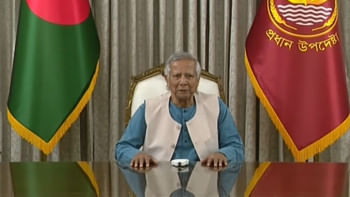Byajstuti: Sadness of Daily Life

Anarchy has become like daily soap in our day-to-day life. Most of us seem to be "know all, see all" types, but say nothing. Sometimes, it seems our enthusiasm to revolt has dried out completely. We blame our motherland, running a reverse race to no one apparently knows where. But do we care? Most of us don't. Byajstuti is a representation of thoughts unpleasant but necessary to our world, thoughts that we should pay heed to. Omar Faruque, the author of the book, has tried to prick, if not dig up, the almost dried out conscience of the society. Byajstuti is a collection of 42 short essays, basically newspapers articles, published in different dailies and online mediums. Its introduction is by the prominent public intellectual and writer of the present age, Serajul Islam Chowdhury.
Byajstuti addresses a variety of topics, ranging from democracy to language; higher education to the agony of farmers; walled-in childhoods to football fanatics hoisting flags of different nations on our rooftops. A sense of pain and a profound sensibility is visible throughout the book. As Professor Chowdhury notes, Faruque is aggrieved and weary of much that he sees, but not ultimately annoyed or frustrated by them. He is not even furious as an earlier generation of "angry young men" were said to be. He does not try to be either like Jonathan Swift or John Osborne. Faruque's short essays are not weighed down with bulky words or phrases. They just aim to represent the malaises of our society and the country as a whole. What is evident everywhere in these essays is the sense of affection that animates them.
Byajstuti scoffs at social discrimination, but there is a compassionate plea in its pages urging people to overcome such behavior. Omar Faruque is worried about the hostilities rampant in our world; he is worried about the militant activities reported throughout the country; he has a careful eye for issues such as public examinations and question paper leaks. He also writes well about Bangabandhu Sheikh Mujibur Rahman and national events such as the 21st February. Byajstuti worries about the captive childhood of our metro-children, the pain endured by some of the people at the bottom rungs of our world and the abuse of Bangla, our mother tongue. In the end though, the author manages to be optimistic. He believes, indeed, that every cloud has a silver lining.
Byajstuti is written standing on the shores of a putrefying capitalism. The author senses the hostility of a decadent system. In its last stage, capitalism is gusting as hard as it can. People are becoming more mechanical or chasing mirages because of it. Byajstuti believes that some people can still detect its contradictions; they want cures, and sooner and not later.
Byajstuti, however, lacks detailed discussions in some places. Perhaps this is due to the author's need to accommodate his thoughts in the allocated space of newspapers and/ websites. In fact, the author should have tried to re-write some of these essays for book publication. The titles of some of the pieces too could have been more specific.
Monjur Arif is a student of Begum Rokeya University.


 For all latest news, follow The Daily Star's Google News channel.
For all latest news, follow The Daily Star's Google News channel. 



Comments